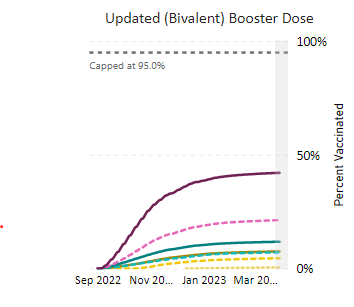|
Which horse film is your favorite? This poll is closed. |
|||
|---|---|---|---|
| Black Beauty |
|
2 | 1.06% |
| A Talking Pony!?! |
|
4 | 2.13% |
| Mr. Hands 2x Apple Flavor |
|
117 | 62.23% |
| War Horse |
|
11 | 5.85% |
| Mr. Hands |
|
54 | 28.72% |
| Total: | 188 votes | ||
|
small butter posted:Just to be clear, I did not agree with the CDC guidelines back then and think that they should have kept it for 7 days, but I understand and respect the scientific and political reasoning behind it. I don't go out of my way to say that the CDC was simply "doing the bidding of Delta."
|
|
|
|

|
| # ? May 25, 2024 19:11 |
|
Gio posted:Why not? It’s a lot more accurate of a statement to say power makes policy than believing policy is derived through a rational cost-benefit calculus. Sometimes policy is allowed to be rational, but more often than not it's like you say. Time to rewatch hypernormalisation.
|
|
|
|
Not directed at you but: I think if your model for understanding the CDC’s decision making process over the past three years is one of them adapting to the shifting landscape of scientific discovery, rather than one where they cynically use science to rationalize policies sought by those in power (e.g. covid doesnt spread in schools, 3 ft=6ft, vaccinated don’t need to mask, 99% of those in hospital are unvaccinated, shortened isolation periods etc. etc.), then you’re either hopelessly naive or a cynic yourself.
|
|
|
|
Gio posted:Not directed at you but: I think if your model for understanding the CDC’s decision making process over the past three years is one of them adapting to the shifting landscape of scientific discovery, rather than one where they cynically use science to rationalize policies sought by those in power (e.g. covid doesnt spread in schools, 3 ft=6ft, vaccinated don’t need to mask, 99% of those in hospital are unvaccinated, shortened isolation periods etc. etc.), then you’re either hopelessly naive or a cynic yourself. To say "the CDC made all their decisions because Number!" is just as silly as saying "they did it purely on science." It was a combination of factors.
|
|
|
|
No amount of 'cdc says so and so' was going to keep me from having to field 'so how're you going to keep us safe?' questions from people who /had/ to spend hundreds of dollars a night to go to an indoor water park in fall of 2020. They had their child's birthday to celebrate! No they weren't going to wear a silly mask (not that they could in the water park.) No they weren't going to demonstrate .personal responsibility. by telling their spawn 'hahaha. no.' Life as normal! and they wanted to know how often we were going to wipe down the check out desk while they spent 10 minutes talking face to face with someone who's breathing in the personal space of hundreds of people a day.
|
|
|
|
Mellow Seas posted:It's not just "those in power," though; a broad cross-section of Americans has opposed various covid measures at times. If the CDC makes recommendations that people won't follow, then they're just as useless as no recommendations at all. Every decision they've made has been a balance of science and the interests/desires of many stakeholders, which yes, includes the business community and other powerful people, but also includes all the regular people who were/are no longer willing to modify their behavior after vaccines were widely adopted and death rates fell drastically. Nevermind that, in all honestly, science isn’t going to tell you what an acceptable burden of death and disease on a society looks like. However, the CDC’s decisions made that burden of death and disease far greater than it needed to be, objectively speaking, and I refuse to be so cynical as to think “well they did the best they could with what they had.” Saying “the CDC has to issue guidance people will follow” with whatever policy they go with as “what people will follow” is just a self-fulfilling prophecy. You have no idea what could have been achieved with better decision making on their part. Gio fucked around with this message at 00:08 on Mar 14, 2023 |
|
|
|
Crucial new evidence for zoonosis: https://www.theatlantic.com/science/archive/2023/03/covid-origins-research-raccoon-dogs-wuhan-market-lab-leak/673390/
Silver2195 fucked around with this message at 13:29 on Mar 17, 2023 |
|
|
|
Mellow Seas posted:It's not just "those in power," though; a broad cross-section of Americans has opposed various covid measures at times. If the CDC makes recommendations that people won't follow, then they're just as useless as no recommendations at all. Every decision they've made has been a balance of science and the interests/desires of many stakeholders, which yes, includes the business community and other powerful people, but also includes all the regular people who were/are no longer willing to modify their behavior after vaccines were widely adopted and death rates fell drastically. This model of designing safety regulations around the lowest acceptable common denominator is patently stupid and should not be the role of the CDC. Imagine applying it to workplace safety, seatbelt use (which many people hated when it was first mandated but is now widely accepted), or basically any other comparable scenario. It is also worth reiterating that the CDC actively discouraged the use of N95 masks until January 2022 (nearly a year after they became widely available again) and did not start discouraging cloth/surgical mask use then either. There was and still is no justification for such misleading and misinformed guidance.
|
|
|
|
Mellow Seas posted:It's not just "those in power," though; a broad cross-section of Americans has opposed various covid measures at times. If the CDC makes recommendations that people won't follow, then they're just as useless as no recommendations at all. Every decision they've made has been a balance of science and the interests/desires of many stakeholders, which yes, includes the business community and other powerful people, but also includes all the regular people who were/are no longer willing to modify their behavior after vaccines were widely adopted and death rates fell drastically. Disagree. Hard disagree. The CDC should make best practice recommendations so that those who want to follow them know what they are. If someone doesn't wear a mask despite the recommendation of the CDC because they don't want to, that's on them. If someone doesn't wear a mask because the CDC did some dumb loving triangulation such that they don't recommend masking, then that is on the CDC. Just because some people won't follow advice is no reason to sabotage that advice for the people who would.
|
|
|
|
It’s also worth noting that the “meet them where they are” model of public health is one pushed in the media last year to rationalize the dismantling of any and all Covid restrictions. So while some are insinuating science had an equitable/fair stake in CDC decision making, they’re doing so while regurgitating lines disseminated by those in power.
|
|
|
|
Any developments on booster shots now that covid is ""over""? Like new mutivarient ones, and can you still get them every six months and have it covered?
|
|
|
|
Mercury_Storm posted:Any developments on booster shots now that covid is ""over""? Like new mutivarient ones, and can you still get them every six months and have it covered? That's a very good question and the answer appears to be uhh, we're not sure, this is completely new territory for medical science and regulation.
|
|
|
|
Near-complete abdication of responsibility, in short. We're firmly in "hope that the nasal / pan-coronavirus vaccine development goes well" territory.
|
|
|
|
Did either of you read the linked article? It doesn't remotely match the nonsensical doomsaying. The FDA advisory panel met in January and voted to move forward with an FDA proposal for harmonized annual COVID boosters.
|
|
|
|
Discendo Vox posted:Did either of you read the linked article? It doesn't remotely match the nonsensical doomsaying. The FDA advisory panel met in January and voted to move forward with an FDA proposal for harmonized annual COVID boosters. If annual boosters were enough to solve the problem, we’d be out of this by now. It evidently isn’t enough, not least because uptake of the boosters is low.
|
|
|
|
Discendo Vox posted:Did either of you read the linked article? It doesn't remotely match the nonsensical doomsaying. The FDA advisory panel met in January and voted to move forward with an FDA proposal for harmonized annual COVID boosters. That would be more reassuring if there weren't evidence that monovalent mRNA vaccine effectiveness wanes after 6 months*, and if dominant variants weren't changing on much shorter timescales than a year. * no, obviously there isn't comparable data for the bivalent booster since it has only been widely available for 7 months. So far the CDC has reported: quote:Early Estimates of Bivalent mRNA Booster Dose Vaccine Effectiveness in Preventing Symptomatic SARS-CoV-2 Infection Attributable to Omicron BA.5– and XBB/XBB.1.5–Related Sublineages Among Immunocompetent Adults Fine** for now, but nothing conclusive for the next 5-6 months assuming that's when the next mRNA updates will be (uptake of which does not seem likely to be improved from the current pathetic rates). Also: quote:Early Estimates of Bivalent mRNA Vaccine Effectiveness in Preventing COVID-19–Associated Emergency Department or Urgent Care Encounters and Hospitalizations Among Immunocompetent Adults **Fine in the sense of not significantly worse than a year ago, for those who bothered to get boosted and didn't get lingering symptoms from a breakthrough infection, if any. Population-wide in the US, not so much. Precambrian Video Games fucked around with this message at 18:12 on Apr 1, 2023 |
|
|
|
Kestral posted:If annual boosters were enough to solve the problem, we’d be out of this by now. It evidently isn’t enough, not least because uptake of the boosters is low. I mean, whats your standard for 'out of it'
|
|
|
|
eXXon posted:That would be more reassuring if there weren't evidence that monovalent mRNA vaccine effectiveness wanes after 6 months*, and if dominant variants weren't changing on much shorter timescales than a year. That article talked about that exact point: quote:Should we move to a once-a-year booster strategy? That last line is an important one, and goes back to Vincent's point: we're still very much in unknown territory here, and policymakers have had to do a lot of educated guessing throughout the COVID pandemic. And the "great need to simplify our boosting recommendations" is also crucial. Currently, given the dismally poor uptake of the bivalent booster, how to encourage voluntary compliance is also an important question. Even if the booster's effectiveness does decline somewhat over time, as the original vaccine did, it's still unlikely to be worse than not getting the vaccine at all. If creating a simple, consistent vaccination schedule makes it more likely for people to actually get the booster in the first place, then it's a net plus, even if the schedule interval is too long to guarantee maximum immunity benefits.
|
|
|
|
Main Paineframe posted:That article talked about that exact point: They need to just do rolling updates, stop trying to limit it by population when it first comes out like they’re Beyoncé tickets for Make-A-Wish kids instead of a shot maybe 20% of the population cares about and just make it come in, has it been at least three months since your last shot/infection? Ok here. End of story. At least until they find a sterilizing vaccine.
|
|
|
|
I'm entirely unclear on how the guidance for mRNA boosters can be any more simple than it is now. It's been bivalent-only since September 2 (later for under 12, fine) and the CDC guidance is:quote:CDC recommends 1 updated booster dose: Precambrian Video Games fucked around with this message at 19:43 on Apr 1, 2023 |
|
|
|
eXXon posted:I'm entirely unclear on how the guidance for mRNA boosters can be any more simple than it is now. It's been bivalent-only since September 2 (later for under 12, fine) and the CDC guidance is: That’s what it is now. When the bivalent first rolled out it was only over 65 or certain comorbidities and you had to be at least three (four? Six?) months out from your last shot or infection, then they kept going down in age and I want to say kept altering what a comorbidity was. And of course no kids under 12, then under five, then some series of shots could get the bivalent and others weren’t eligible for kids (Pfizer vs Moderna) it was confusing as all hell.
|
|
|
|
Oracle posted:That’s what it is now. When the bivalent first rolled out it was only over 65 or certain comorbidities and you had to be at least three (four? Six?) months out from your last shot or infection, then they kept going down in age and I want to say kept altering what a comorbidity was. That's what it was before September 2. After that it was recommended for anyone 12+ (the communication of the guidelines was bad, yes, but I'm not expecting it to improve). The caveats about waiting x months before your last booster/infection seem unlikely to change. So I'm asking what's going to be significantly different on September 2, 2023, if a new mRNA booster gets rolled out? It will have been a full year of widespread availability of the current bivalent boosters. What's going to change holdouts minds? - A hypothetical formulation change to target subvariant XBB1.? seems unlikely to be any more compelling than the bivalent booster targeting Omicron. - A combined flu/covid vaccine may make it (seem) more convenient. I have nothing against this idea, although I wonder if it might increase skepticism of the flu vaccine. - A fresh new marketing campaign... based on what, though? Potentially misleading advice that you only have to get it once a year now (with the obvious retort being that you don't have to get it at all)? Chances are they won't recommend a second bivalent booster for the general population before then anyway. The above is why some of us are concluding that: Kestral posted:We're firmly in "hope that the nasal / pan-coronavirus vaccine development goes well" territory.
|
|
|
|
I can only speak for itself, but I would like for life expectancy to cease its decline and return to levels previously seen in this century.
|
|
|
|
I’d like to see less than a hundred people a day dying of it before I relax. Also it’d be awesome if it could stop mutating to evade immunity every six weeks.
|
|
|
|
Oracle posted:Also it’d be awesome if it could stop mutating to evade immunity every six weeks.
|
|
|
|
It looks like we are near an all-time low right now; that's nice. Credit to the bivalent boosters? Uptake is low overall but pretty decent among the most vulnerable (people in nursing homes and such). We stalled out in the mid-triple digits daily for all of '22 so if we could go down from there, that'd be great. Random numbers I pulled together, Since 2020 covid has been responsible for - 1.3% of deaths 0-17 - 3.4% of deaths 18-29 - 6.5% of deaths 30-39 - 10.2% of deaths 40-49 - 11.2% of deaths 50-64 - 11.4% of deaths 65-74 - 11.0% of deaths 75-84 - 9.7% of deaths 85+ Just a lil over a thousand deaths per day average over the last three years. They've ranged from ~3200 a day (Jan '21) to ~230 a day (this week). Over that time period about 8-10 times as many people under 18 have died from overdoses as Covid. People in their 40s were about equally likely to die from either. 25-30 times as many people over 55 died from Covid as overdoses. Just some numbers I dunno I was bored. Saturday night baby.
|
|
|
|
I am reminded of this story from June. Even now, at an ahistoric low, without adjustment for unrecorded deaths, things are worse than what the Biden administration considered might be acceptable losses. How many Covid deaths are acceptable? Some Biden officials tried to guess. By RACHAEL LEVY 06/06/2022 04:30 AM EDT Biden officials in recent months privately discussed how many daily Covid-19 deaths it would take to declare the virus tamed, three people familiar with the conversations told POLITICO. The discussions, which took place across the administration, and have not been previously disclosed, involved a scenario in which 200 or fewer Americans die per day, a target kicked around before officials ultimately decided not to incorporate it into pandemic planning, according to the people. The discussions were described as exploratory, said the people, who were granted anonymity so they could speak freely about internal deliberations. One U.S. health official told POLITICO the number was “aspirational ... a general metric people have bounced around a lot” that would signal that “the pandemic would be under control.” But, this person added, the figure “never passed the hurdles to be a formal metric.” The sensitive nature of the conversations and the decision not to bring any hard number to the most senior members of the coronavirus task force or top Biden officials demonstrates the longstanding struggle to articulate when the country has controlled a pandemic that has already killed more than 1 million Americans and is still claiming nearly 300 lives every day. Fewer than 200 people dead a day would translate to about 73,000 deaths per year, slightly more than what the U.S. experiences during a bad flu season. Because the virus continues to evolve, officials have largely shied away from promoting any metric, especially after the administration appeared to herald Covid’s end last summer, just ahead of the Delta and Omicron waves, which led to hundreds of thousands of deaths. “They don’t want to say that it’s tolerable for 200 Americans a day to die,” added one of the three people familiar with the matter, who personally discussed the number with administration officials.  Still, the discussions represented at least a nascent effort to create a framework for a post-Covid world. One of the three people involved in the conversations last year said it was an effort to gauge what the American public would “tolerate.” “Five hundred a day is a lot. You still have 9/11 numbers in a week,” the person said. “People generally felt like 100 [a day] or less, or maybe 200, would be OK.” With fewer than 200 people dead per day, the person added, hospitals wouldn’t be overrun and infection rates would be comparatively low, allowing Americans to live closer to pre-pandemic times with less threat of infection. “When you spread 100 to 200 [deaths] around the country, then it’s minimal around your [geographic] area,” the person said. But the idea never became official. Cyrus Shahpar, the White House’s pandemic data director, told POLITICO that pinpointing a number “doesn’t make sense from a public health perspective because it’s also about how long you’re able to maintain low numbers or low severity of illness,” and the virus can evolve quickly. “Because these things are all changing, I think most experts would tell you it’s hard to have any kind of durable number … because the overarching goal for us is to drive down deaths,” he said. “There’s no point at which you give up trying to drive down deaths.” “We’re not satisfied with the number of deaths we have now,” he added. “I don’t really know why 200 would be a number that would be magically OK.” At no point since the pandemic’s first weeks have fewer than 200 Americans died per day at a sustained rate. During the country’s best stretch, last summer, an average of 230 Americans died daily. A few months later, Omicron killed more than 2,600 Americans per day, many of whom were vaccinated. The White House for months has focused more on hospitalizations and deaths than infections, telling Americans that Covid-19 is more manageable because of vaccines and therapeutics. The Centers for Disease Control and Prevention updated its guidance so that mask recommendations were tied to hospitalizations instead of infections and let mask mandates on public transportation lapse. Inside the White House, there has been debate over how vigilant the public should be considering roughly 2,000 Americans are dying every week and the CDC expects deaths to rise in the weeks ahead as cases are forecast to surge nationwide. While vaccines greatly reduce the risk of death, only 67 percent of Americans meet the CDC’s definition of fully vaccinated, a figure that doesn’t include boosters, placing the U.S. 68th globally, behind countries like Bangladesh and Rwanda, according to Our World In Data. Less than one-third of Americans have received a booster shot. Using daily deaths as a metric of success is not a new idea. The administration’s external advisers proposed a similar figure in recent months and public health experts have debated what death toll policymakers should target throughout the pandemic. Communication around the pandemic and its eventual end, however, have long presented a challenge for the White House, which has nudged vaccinated Americans toward pre-pandemic life while also extending a public health emergency declaration that grants state and federal government a host of special powers. Meanwhile, the administration is asking Congress for billions of dollars to purchase additional vaccines and therapeutics ahead of an expected fall surge in cases. “So if you’re wondering what is it that really worries me — I think we have the tools for the summer,” Covid coordinator Ashish Jha told a largely maskless crowd of journalists inside the White House on Thursday. “We will not have the tools for the fall and winter, unless Congress steps up and funds us.” Platystemon fucked around with this message at 12:29 on Apr 3, 2023 |
|
|
|
Well, just because we (quite nearly) got down to 200 once before and it didn't stay that way doesn't mean that getting it down to 200 again isn't worth celebrating. I can easily imagine things falling even further during the warm months. It's extremely unlikely that we will see a death spike like winter '22 again; that was the result of an unstoppably contagious variant tearing through a population that was somewhat less vaccinated than they are now and had vastly less acquired immunity than they do now (because the Omicron wave infected like, literally over half the country.) Very bad variants may well come down the pike at some point, but that's something that we have to deal with when it happens (but prepare for now, obviously) - we can't eradicate the disease, so all we can try to do is minimize its spread to give it less chance to mutate. But it'll still mutate. And, on the slightly morbid side, there's a huge amount of variation in how people react to an infection, and a large amount of people with a genetic disposition to developing life-threatening Covid rather than a mild case have, you know, already died. So that'll "help." Mellow Seas fucked around with this message at 16:18 on Apr 3, 2023 |
|
|
|
COVID deaths right now are at an all time low, as Mellow mentioned, but the data specifically are here if anyone else wants a link: https://www.cdc.gov/coronavirus/2019-ncov/covid-data/covidview/index.html - under category "Deaths". Weekly deaths at 1596. Of course maybe people dying of pneumonia aren't getting tested etc. I didn't notice that Google stopped showing COVID stats when you search [covid deaths + country]. I wonder when that stopped, I don't think I've looked in about 6 months. Mellow Seas where'd you get those stats of deaths by age? That's interesting / horrifying to see, but it'd be interesting to break it down by year. At least for my anecdotal experience, I haven't heard about anyone getting especially sick or dying of COVID in more than a year since omicron+third booster, even from friends-of-friends, and this includes COVID tearing through my parents' and all my friends' parents' social networks between May 2022-present. I stopped really bothering to follow up on COVID news after it went through everyone I know above 70, and I guess so did everyone else since this thread gets like 20 posts/month.
|
|
|
|
Mellow Seas posted:It's extremely unlikely that we will see a death spike like winter '22 again; that was the result of an unstoppably contagious variant tearing through a population that was somewhat less vaccinated than they are now and had vastly less acquired immunity than they do now (because the Omicron wave infected like, literally over half the country.) [citation needed], but also, consider extrapolating these trendlines to October:  
|
|
|
|
Saladman posted:I didn't notice that Google stopped showing COVID stats when you search [covid deaths + country]. I wonder when that stopped, I don't think I've looked in about 6 months. Got the % numbers from here, which includes total deaths, covid deaths, influenza deaths and pneumonia deaths since the start of the pandemic, broken down by age. I just did some division to get the percentages. I'd also be interested in a breakdown by year because obviously the numbers would be much lower if you looked at '22, and would be on track to be even lower in '23. I'm sure yearly breakdowns of those stats are available somewhere (possibly even on the CDC website but I didn't look extensively). eXXon posted:[citation needed] I said "somewhat more vaccinated," not "dramatically," and I think the data (which I had looked up prior to making the assertion, because I don't talk out of my rear end, thanks) supports that. There was actually significant vaccine uptake over this winter. Figures. Graph showing slight acceleration of vaccinations in late '22:  And acquired immunity is leagues ahead of where it was 18 months ago. I would note again that bivalent uptake is highest among the people who are most vulnerable to Covid. And people who received a bivalent booster this fall would be very likely to do so in the years to come, especially because older people tend to listen to their doctors. And the uptake rates we got this winter happened without any omicron-style tidal wave or huge spikes in death; if either of those things started to happen a lot more people would be running to CVS. I got one myself, because I'm the kind of person who is still analyzing Covid stats in 2023, but at this point I honestly can't really blame anyone under 50 for not bothering with a bivalent because at this point they are at, essentially, zero risk of death from Covid. (Yes, a handful of people die, but despite the disease being so widespread, dying from it for young people is kind of a freak thing like dying of meningitis or a staph infection.)
|
|
|
|
Mellow Seas posted:It's extremely unlikely that we will see a death spike like winter '22 again; that was the result of an unstoppably contagious variant tearing through a population that was somewhat less vaccinated than they are now and had vastly less acquired immunity than they do now (because the Omicron wave infected like, literally over half the country.) I wouldn’t say that, and not just because of the potential for the emergence of a distant lineage from some reservoir. The reason I wouldn’t say it is that this last winter was a worse one in Europe than the winter of the BA.1/BA.2 wave.  All‐cause weekly mortality Image from latest EuroMOMO bulletin, twelfth week of 2023. Note both axes of the chart. The severe flu season of 2017–2018 is present, as is the more typical 2018–2019 season. Platystemon fucked around with this message at 11:29 on Apr 4, 2023 |
|
|
|
Isn't all causes mortality in Europe just elevated in 22-23 because of the war? The regular old covid stats show the same pattern as the US - a much lower number of covid deaths over the last six months than the previous two winters.
|
|
|
|
It's not to do with the war, in the UK at least hospital services were hammered to the point where people were waiting an hour for ambulances and such.
|
|
|
|
Okay, why isn't that in the death stats? Assuming the answer is a lower CFR, if an outbreak that bad led to 1/4 of the deaths of the previous winter shouldn't that be encouraging, not discouraging, regarding future death totals?
|
|
|
|
I meant that those deaths weren't necessarily from COVID infections, they were things like flu and heart attacks that just swamped everything. The biggest issue is that if these things aren't fixed properly the same thing could happen next winter as well. I agree with you that COVID waves in the future won't cause as much death, but they will continue to exacerbate existing problems.
|
|
|
|
https://twitter.com/sailorrooscout/status/1643994000473608198 The future is looking bright!
|
|
|
|
RFK Jr. has announced he's running as a spoiler in the Dem primary. I may have to dust off the antivaxx bookshelf and review some of his "output". He's also, zero surprise, getting boosted on Sputnik.
|
|
|
|
https://twitter.com/SolidEvidence/status/1650211417801256961 https://twitter.com/SolidEvidence/status/1650579844512776192
|
|
|
|

|
| # ? May 25, 2024 19:11 |
|
Piss Creep posted:https://twitter.com/SolidEvidence/status/1650211417801256961 Man I feel sorry for that dude with his replies. First he has to fight a blue check idiot, then a whole batch of people asking him "what does this mean?" while he has to repost the same explanation over and over. He has the patience of a saint.
|
|
|




























